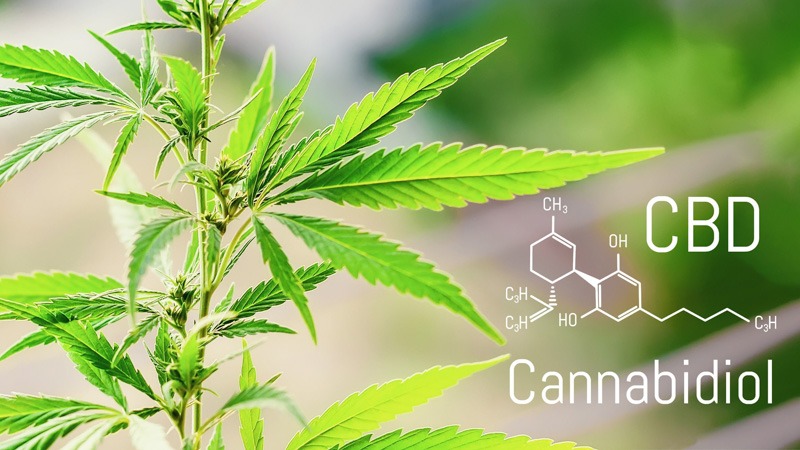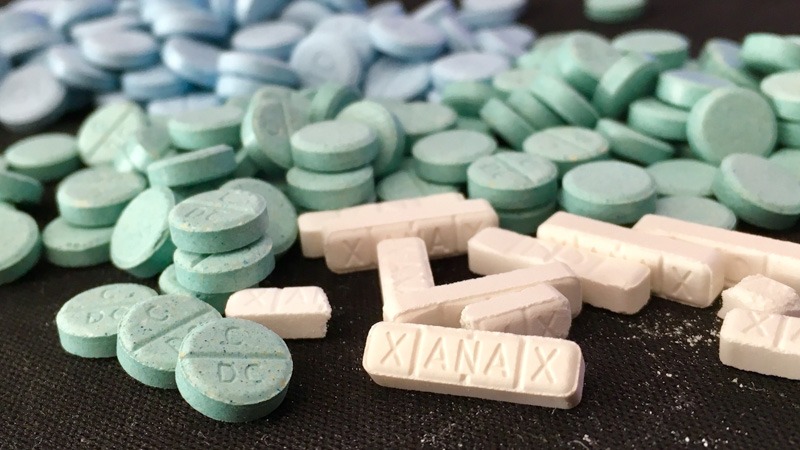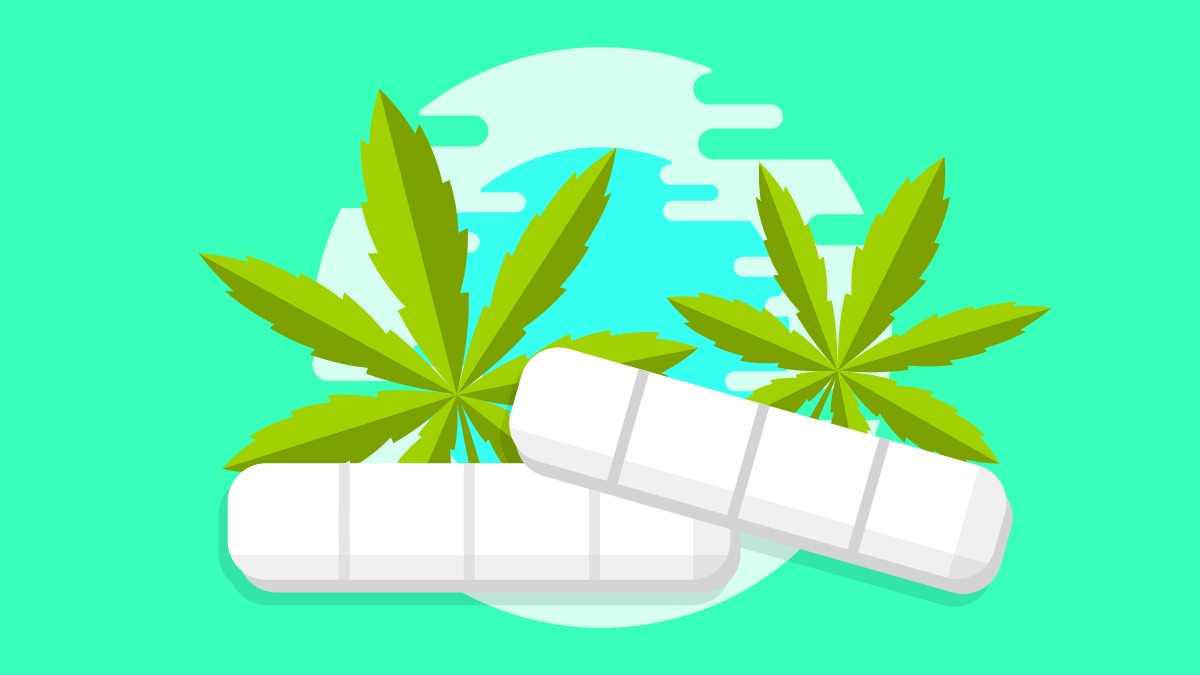Xanax is a trademark name for an anti-anxiety medication classified as a benzodiazepine.
People use this drug to force the nervous system to relax — effectively keeping anxiety at bay.
However, the major risk with benzodiazepines is their potential for abuse. These compounds can make the user become addicted to them. As soon as Xanax stops working, the brain returns into its superactive state, resulting in a deteriorated mood and severe anxiety attacks.
Other side effects of Xanax include insomnia and emotional instability.
Many people are trying to ditch benzodiazepines but to no avail due to their addictive potential and debilitating anxiety attacks.
Cannabidiol (CBD) appears to be a healthy alternative to anti-anxiety drugs; research also shows that CBD and other cannabinoids can effectively curb withdrawal symptoms associated with kicking the habit.
In this article, we’ll discuss how people are using CBD to deal with Xanax addiction and to reduce anxiety attacks.
Let’s start by explaining the mechanism of interaction between CBD and Xanax.
Potential Interactions Between CBD and Xanax
- Alprazolam, the active ingredient in Xanax, is broken down by CYP3A4, a type of enzyme that belongs to the CYP450 system, as reported in a Japanese study in the Yamagata University School of Medicine (1). The CYP3A4 enzyme is mostly found in the liver and small intestine; it metabolizes many of the medicines we take.
- Another Japanese study has found that CBD exerts inhibitory actions against the human CYP3A system of enzymes.
- When CBD influences the CYP450 system, it can result in increased concentrations of certain drugs in the system, causing adverse effects, and sometimes, toxicity (2).
- According to a study published in Cannabis and Cannabinoid Research, CBD isn’t recommended along with prescribed benzodiazepines (3).
- Since benzodiazepines are metabolized by the same enzymes that CBD blocks, taking CBD with Xanax or any other benzodiazepine can lead to dangerous side effects. If you want to take CBD oil for anxiety instead of Xanax, you should consult a doctor experienced in cannabis therapies to get professional advice.
Can You Take CBD with Xanax?

People with anxiety suffer from imbalances of neurotransmitters in the brain. Doctors prescribe Xanax level out these imbalances. Veterinarians also give Xanax to dogs who have anxiety or experience panic attacks, although the U.S. Food and Drug Administration (FDA) has not approved it as veterinary medicine.
Xanax belongs to a class of substances known as benzodiazepines. Benzodiazepines influence the central nervous system, acting as depressants, which are compounds that calm down the nervous system by agonizing the GABA receptors.
When you take Xanax, it travels to your liver through the digestive system. There, it gets metabolized by a family of enzymes called Cytochrome P450. These enzymes are essential for processing many medicines and compounds within the human body.
Xanax is metabolized precisely by the CYP3A4, which belongs to the CYP450 group and detoxifies the bile acid, terminates the activity of steroid hormones, and eliminates chemicals from food and drugs
Although there have been no clinical trials or case studies investigating potential CBD-Xanax interactions, CBD has been highlighted as the inhibitor of the aforementioned enzymes, especially CYP3A4 and CYP3A5.
The interaction between CBD and the enzymes in the liver may result in either sub-therapeutic effects or toxicity of certain drugs in the system (4).
Scientists believe that this ability of CBD derives from its relationship with the endocannabinoid system, a complex intracellular network in the body that helps it maintain homeostasis.
A higher concentration of Xanax in one’s blood may lead to dangerous side effects, including vomiting of blood, irregular heartbeats, ear congestion, uncontrolled twisting movements of the limbs, and hyperventilation.
We encourage you to consult a cannabis expert doctor before supplementing CBD in your Xanax routine.
Can You Substitute Xanax with Another Benzodiazepine if You Want to Take CBD?
The cytochrome P450 system metabolizes a vast range of drugs, including those classified as benzodiazepines
This means that CBD’s interaction with this system impairs the liver’s ability to metabolize not only Xanax but also similar medications.
The list of benzodiazepines prescribed by doctors include:
- Alprazolam
- Brotizolam
- Midazolam
- Triazolam
- Quazepam
- Diazepam (Valium)
- Flunitrazepam
Is CBD an Effective Alternative to Xanax?
Thus far, no specific study has investigated the efficacy of CBD as a replacement for Xanax or any other benzodiazepine medication
There’s only one study regarding a similar subject. The said study examined the possible impact of THC and CBD among people addicted to benzodiazepine and was conducted in 2019 in the journal Cannabis and Cannabinoid Research (5).
Researchers in the study found that roughly 45% of the participants had ceased on benzodiazepines within about six months of starting their medical cannabis treatment. Most of them also reported decreased daily discomfort due to medical conditions after receiving cannabis.
However, the study involved medical cannabis that contained both CBD and THC. The authors haven’t focused exclusively on CBD, so we can’t tell whether the effects resulted from CBD alone or from the combination of both.
Also, the ratios of CBD and THC used in patients who continued, and those who discontinued benzodiazepines wasn’t significantly different. The researchers weren’t able to determine what type of cannabis strains it was, not to mention the growth and manufacturers.
Still, the authors of the study do not recommend using cannabis instead of benzodiazepines. Those who want to stop taking Xanax should first see their doctor. The doctor will aim at gradually reducing the dose before completely weaning off, which may prevent unpleasant withdrawal symptoms and the recurrence of anxiety attacks.
Withdrawal symptoms from Xanax include convulsions, sweating, tremors, vomiting, stomach or muscle cramps, or strange behavior.
Doctors also discourage patients from taking other medications, including prescription and over-the-counter medicines or supplements, unless they have been talked about with a doctor.
Contraindications for Taking Xanax

You should definitely weigh the risk against the benefits of taking Xanax. For using alprazolam, the following instances are contraindications:
Allergies
Inform the doctor about any unusual allergic reaction to Xanax or any other medicines. Also, make sure to tell a healthcare professional about any other types of allergies, such as allergies to pollen, foods, animals, or preservatives. For OTC medication and supplements, carefully read the product label before use.
Pediatrics
No study has yet investigated the relationship of age to the effects of Xanax in children. Therefore, children shouldn’t take alprazolam.
Geriatric
Although research hasn’t demonstrated geriatric-specific concerns that would limit the usefulness of Xanax in the elderly, older adults are more likely to experience side effects such as dizziness, confusion, clumsiness, severe drowsiness, or unsteadiness. Moreover, the kidney, liver, and lung problems may also occur. In case of such an event, seek immediate medical attention.
Pregnancy
Studies in pregnant women have warned women against using Xanax due to the potential risk of harm to the fetus, as reported by Mayo Clinic. However, sometimes, the benefits of the Xanax treatment in a life-threatening situation or a severe mental disease may outweigh the risk.
Breastfeeding
Mayo Clinic recommends that breastfeeding women abstain from taking Xanax due to harmful infant effects. Doctors should find a safer alternative or breastfeeding should be stopped if cessation is impossible.
What Other Drug Interactions Are Possible with Xanax?
Specific medicines shouldn’t be combined at all. However, some cases may require mixing two different drugs together despite the risk of an interaction.
In these cases, a doctor may want to adjust the dose of both drugs or implement other precautions if necessary.
When you take this medicine, your doctor must know of any of the pharmaceuticals below. Taking Xanax with any of the following medicines is not recommended.
- Delavirdine
- Flumazenil
- Itraconazole
- Ketoconazole
- Alfentanil
- Amobarbital
- Benzhydrocodone
- Bromazepam
- Bromopride
- Buprenorphine
- Butabarbital
- Butalbital
- Butorphanol
- Cannabidiol
- Carbamazepine
- Carbinoxamine
- Carisoprodol
Benzodiazepines 101: What You Need to Know About Modern Sedatives

Benzodiazepines have been the most popular prescription sedatives and tranquilizers for many years according to an article on Harvard Health.
Also called benzos, benzodiazepines increase the activity of the receptors for the neurotransmitter gamma-aminobutyric acid (GABA).
GABA stops certain neurons from firing, slowing down the brain and nervous system, so benzos are known for their ability to calm the user and promote sleep.
The effects of benzodiazepines vary depending on their type. Users may experience a different duration of effects, different absorption rates, and different half-life.
Doctors also prescribe benzos for acute seizures, tremors, severe muscle spasms, and alcohol and drug withdrawal symptoms. However, their main therapeutic target is the treatment of anxiety and insomnia.
The Anxiety and Depression Association of America (ADAA) reports that benzodiazepines, such as alprazolam, clonazepam, lorazepam, and diazepam, induce relaxation, relieve muscle tension, and reduce other physical symptoms of anxiety (6).
Benzodiazepines are also often used for minor medical procedures regarding short-term management of anxiety.
Side Effects of Long-term Use of Benzodiazepines
According to a 2015 study published by Australian Prescriber, the long-term use of benzodiazepines has well-recognized harms on our health. These include addiction and poor cognitive performance (7).
Over the last twenty years, the number of benzodiazepines on every prescription has increased, with Xanax being the most frequently prescribed medication. Those who have been taking benzodiazepines for over six months are at a higher risk of developing an addiction.
Benzo-related health concerns include misuse, dependency, impairment of motor skills, and lethal overdose.
Studies have associated the use of benzodiazepines by the elderly with dementia and falls. There’s also evidence of higher mortality rates in long-term Xanax users.
Alprazolam (Xanax) was rescheduled to Schedule 8 in response to an increase in illicit use. The substance is more toxic compared with other benzodiazepines.
Studies haven’t examined the efficacy of potential treatments for benzodiazepine dependence.
Benzodiazepine Substitutes
Since Xanax has a high potential for abuse and overdose, doctors are seeking alternative options that would have a lower propensity.
The reason for this propensity includes potency relative to the formulation as well as the perception of intoxication. Other indicators for a substitution include shorter half-life and lower risk of withdrawal symptoms.
Healthcare professionals commonly substitute Xanax with drugs that have a shorter half-life, such as diazepam.
With less-potent benzodiazepines, fewer patients taking Xanax drop out. However, there have been no studies that would prove the effectiveness of such substitution.
Going cold turkey after being on benzodiazepines for 1–6 months can cause life-threatening withdrawals such as severe seizures, so the Xanax dose should be gradually lowered.
Can People with Post-Traumatic Stress Disorder (PTSD) Use Benzodiazepines?
Once the primary agents in PTSD treatments, benzodiazepines are now considered controversial when it comes to dealing with the aftermath of trauma.
People with PTSD show a higher rate of panic disorders than other people, regularly suffering from severe anxiety and panic attacks.
Xanax has been used extensively, but controlled studies have failed to support the efficacy of benzodiazepines against the major PTSD symptoms.
Doctors prescribing Xanax to PTSD patients should inform them about the full risk and benefits of these medications, including the risk of addiction, impaired cognition, and severe withdrawals after abrupt cessation.
Research Shows Low Efficacy of Benzodiazepines on People with PTSD or Recent Trauma
Despite being widely used in patients with PTSD, available data suggests that benzodiazepines are not sufficient for effective treatment and may even be harmful, as stated in a 2015 systematic review and meta-analysis in the July Journal of Psychiatric Practice (8).
“Benzodiazepines are ineffective for PTSD treatment and prevention, and risks associated with their use tend to outweigh potential short-term benefits,” concluded Dr. Jeffrey Guina and his research team from Wright State University, Dayton, Ohio.
The authors of the study also found evidence linking to a higher risk of developing PTSD in patients with recent trauma after using benzodiazepines.
How CBD Can Help with Anxiety and Depression

CBD has demonstrated several therapeutic applications with regards to nausea, blood pressure, pain, inflammation, and neuroprotection (9).
CBD oil, which is sourced from cannabis plants, comes in drops, edibles, capsules, vapes, and beverages.
Researchers have found that CBD oil can provide relief from depression, anxiety, and pain-producing more potent effects than conventional medications, but without their side effects.
In 2019, Brazilian scientists tested the efficacy of CBD on subjects 90 minutes before they went through a simulated public speaking test. After trying three different doses — 150 mg, 300 mg, and 600 mg — they found that the 300 mg dose was the most helpful at curbing anxiety during the test (10).
The study has observed no significant differences in anxiety markers when the subjects took a 150 mg dose and a 600 mg dose of CBD.
In another study, CBD oil has been found to safely alleviate insomnia in children (11).
The anxiolytic effects of CBD are associated with its potential ability to modulate the brain’s receptors for serotonin, a neurotransmitter that ensures emotional stability and feelings of well-being.
CBD can also prevent cognitive decline in neurodegenerative disorders. In one study, researchers administered CBD to mice genetically burdened with Alzheimer’s disease, finding that it helped stave off cognitive decline (12).
Anxiety is one of the best-researched areas when it comes to the health benefits of CBD oil.
For example, a 2010 study published in the Journal of Psychopharmacology suggested that CBD could decrease the level of subjective anxiety in patients with social anxiety disorders (13).
A 2015 research paper published in Neuropathic found evidence supporting CBD’s antidepressant-like properties. The authors concluded, “Overall, current evidence indicates CBD has considerable potential as a treatment for multiple anxiety disorders, with the need for further study.” (14)
Researchers from the National Institute on Drug Abuse (NIDA) has recently conducted one of the most meticulous CBD studies involving humans. Researchers of the said study compared the efficacy of CBD, THC, Alprazolam (Xanax), and placebo in healthy recreational drug users to determine whether or not CBD should be rescheduled from a Schedule I category of the Controlled Substances Act.
The study was completed in May 2018. However, we have yet to see the results as they are still pending for publication
CBD Oil for Insomnia: How CBD Regulates Our Circadian Rhythm
Although there are no official recommendations for replacing Xanax with CBD oil, studies have shown that CBD has the ability to regulate our sleep-wake cycle.
For example, lower doses of CBD in the morning can enhance your alertness throughout the day. People who take CBD to kickstart the day typically report higher productivity and better performance at work, which means their brain remains active during that period.
When a person’s brain is active for the most part of the day, it starts receiving signals that it’s time to prepare for rest when the evening draws near.
On the other hand, if your brain is sluggish in the morning and you can barely hold your thoughts together that day, your brain might get activated in the evening because you’ve been slacking around so far — hence the occurrence of running thoughts before bedtime.
Another potential benefit of CBD is how it causes blood pressure to drop at higher doses. This has a sedating effect on the body, causing muscle relaxation and allowing the user to take slower, deeper breaths.
According to animal studies, CBD can also increase the duration of the deep sleep stage while reducing disturbances in the REM stage, where most dreams occur (15).
Is CBD Oil Safe for Anxiety and Depression?
CBD is generally safe and well-tolerated in humans. That being said, it may cause a few mild side effects, including:
- Dry mouth
- Excessive sedation
- Changes in appetite
There’s also a risk of CBD-drug interactions. As mentioned, CBD and Xanax — as well as many other medications — are processed by the same group of enzymes in the liver. Therefore, you should discuss your plans to use CBD oil with a doctor to avoid potentially dangerous interactions.
CBD and Xanax: Summarizing the Do’s and Don’ts
The high potential for abuse and dependency among long-term Xanax users may be the reason why so many people are turning to CBD oil as a natural alternative for anxiety, depression, and insomnia. CBD oil is often used in conjunction with other natural remedies along with behavioral therapies.
CBD’s anxiolytic and antidepressant-like qualities have been demonstrated in several studies, including the 2014 study published in the CNS and Neurological Disorders – Drug Targets.
However, CBD can interact with Xanax and other benzodiazepines. Thus, you should discuss the use of CBD oil with a doctor for professional advice to avoid potentially dangerous interactions.
The U.S. Food and Drug Administration has yet to determine the efficacy and safety of cannabidiol for specific health conditions. To date, the agency has approved one cannabis-derived drug, Epidiolex, which is used for the treatment of rare childhood forms of epilepsy.
Despite the lack of clinical trials or case studies targeted specifically at potential CBD-Xanax interactions, taking these two products together may lead to adverse reactions, such as toxicity of Alprazolam due to the reduced capacities to cleanse the body out of this substance. Keep in mind that benzodiazepines are metabolized by the same enzymes whose activity is compromised by CBD.
References:
- Otani, K. Cytochrome P450 3A4, and Benzodiazepines. Seishin Shinkeigaku Zasshi. 2003;105(5):631-42. Retrieved from https://www.ncbi.nlm.nih.gov/pubmed/12875231.
- Yamaori S, Ebisawa J, Okushima Y, Yamamoto I, Watanabe K. Potent inhibition of human cytochrome P450 3A isoforms by cannabidiol: role of phenolic hydroxyl groups in the resorcinol moiety. Life Sci. 2011 Apr 11;88(15-16):730-6. doi: 10.1016/j.lfs.2011.02.017. Epub 2011 Feb 26.DOI: 10.1016/j.lfs.2011.02.017.
- Dolan, Eric. (2019, May 8). A significant number of cannabis patients discontinue use of benzodiazepines. Retrieved from https://www.psypost.org/2019/05/a-significant-number-of-cannabis-patients-discontinue-use-of-benzodiazepines-53636.
- Otani, K. op. Cit.
- Chad Purcell, Andrew Davis, Nico Moolman, and S. Mark Taylor.Cannabis and Cannabinoid Research.Sep 2019.214-218.http://doi.org/10.1089/can.2018.0020.
- Roy-Byrne, P. What Medications Are Used to Treat Anxiety Disorders? Retrieved from https://adaa.org/learn-from-us/from-the-experts/blog-posts/what-medications-are-used-treat-anxiety-disorders.
- Brett J, Murnion B. Management of benzodiazepine misuse and dependence. Aust Prescr. 2015;38(5):152–155. doi:10.18773/austprescr.2015.055.
- Guina J, Rossetter SR, DeRHODES BJ, Nahhas RW, Welton RS. Benzodiazepines for PTSD: A Systematic Review and Meta-Analysis. J Psychiatr Pract. 2015 Jul;21(4):281-303. doi: 10.1097/PRA.0000000000000091.
- Parker LA, Rock EM, Limebeer CL. Regulation of nausea and vomiting by cannabinoids. Br J Pharmacol. 2011;163(7):1411–1422. doi:10.1111/j.1476-5381.2010.01176.x; Jadoon KA, Tan GD, O’Sullivan SE. A single dose of cannabidiol reduces blood pressure in healthy volunteers in a randomized crossover study. JCI Insight. 2017;2(12):e93760. Published 2017 Jun 15. doi:10.1172/jci.insight.93760; Nagarkatti P, Pandey R, Rieder SA, Hegde VL, Nagarkatti M. Cannabinoids as novel anti-inflammatory drugs. Future Med Chem. 2009;1(7):1333–1349. doi:10.4155/fmc.09.93.
- Linares IM, Zuardi AW, Pereira LC, et al. Cannabidiol presents an inverted U-shaped dose-response curve in a simulated public speaking test. Braz J Psychiatry. 2019;41(1):9–14. doi:10.1590/1516-4446-2017-0015.
- Shannon S, Opila-Lehman J. Effectiveness of Cannabidiol Oil for Pediatric Anxiety and Insomnia as Part of Posttraumatic Stress Disorder: A Case Report. Perm J. 2016;20(4):16-005. doi:10.7812/TPP/16-005.
- Watt G, Karl T. In vivo Evidence for Therapeutic Properties of Cannabidiol (CBD) for Alzheimer’s Disease. Front Pharmacol. 2017;8:20. Published 2017 Feb 3. doi:10.3389/fphar.2017.00020.
- Crippa JA et al. Neural basis of anxiolytic effects of cannabidiol (CBD) in generalized social anxiety disorder: a preliminary report. J Psychopharmacol. 2011 Jan;25(1):121-30. doi: 10.1177/0269881110379283. Epub 2010 Sep 9. DOI: 10.1177/0269881110379283.
- Blessing, E.M., Steenkamp, M.M., Manzanares, J. et al. Cannabidiol as a Potential Treatment for Anxiety Disorders. Neurotherapeutics 12, 825–836 (2015). https://doi.org/10.1007/s13311-015-0387-1.
- Chagas MH et al. Cannabidiol can improve complex sleep-related behaviours associated with rapid eye movement sleep behaviour disorder in Parkinson’s disease patients: a case series. J Clin Pharm Ther. 2014 Oct;39(5):564-6. doi: 10.1111/jcpt.12179. Epub 2014 May 21. DOI: 10.1111/jcpt.12179.

